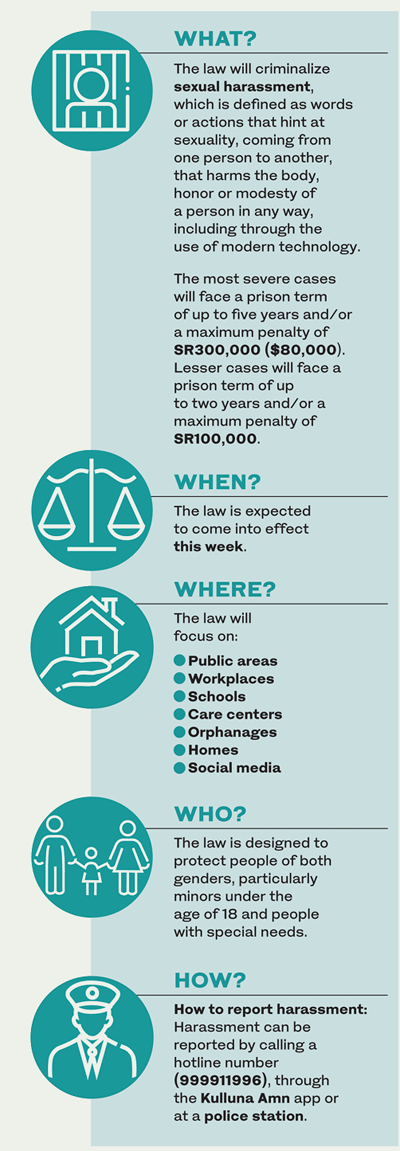RIYADH: Saudi Arabia’s new anti-harassment law will help all individuals live a normal life free of fear, the Interior Ministry’s security spokesman, Maj. Gen. Mansour Al-Turki, has said.
With the new law coming into effect within a couple of days, following its publication in the Official Gazette, Al-Turki explained how it would be implemented in a press conference on Thursday.
The new law, approved by a Council of Ministers meeting last Tuesday, will combat sexual harassment in the Kingdom, which is considered a crime according to Islamic law.
“We expect that this law will lower sexual harassment crimes,” Al-Turki said. “We are working towards not having these crimes in any place in the Kingdom.”
No statistics are available on the incidence of sexual harassment, because of past reluctance to report violations. “These crimes were under the morale law, and because there was little reporting, that is why this law has been provided to protect the identity of the harassed and help them come forward and report incidents,” Al-Turki said.
 The Kingdom has recently witnessed a wide-ranging series of reforms. The ambitious Vision 2030 aims to have women more involved and less segregated than before. While the new law reaffirms women’s role in society, it is not related to women in Saudi Arabia being allowed to drive from June 24, Al-Turki said. In fact, the law applies to both genders.
The Kingdom has recently witnessed a wide-ranging series of reforms. The ambitious Vision 2030 aims to have women more involved and less segregated than before. While the new law reaffirms women’s role in society, it is not related to women in Saudi Arabia being allowed to drive from June 24, Al-Turki said. In fact, the law applies to both genders.
“This law is to help all individuals live a normal life without any incidents of harassment,” he said. “Any person who has been subjected to harassment or has been a witness to it should inform the competent authorities.”
The most severe punishments will be given to those who harass people with special needs and children under the age of 18, with an awareness campaign to be introduced in schools.
“Many people are reluctant to have their children participate in certain activities for fear of being harassed. This law helps put the guardians at ease,” he said.
The most severe cases will face prison terms of up to five years and/or a maximum penalty of SR300,000 ($80,000). Incidents that have been reported more than once will be subject to the maximum punishment.
Lesser cases will face a prison term of up to two years and/or a maximum penalty of SR100,000.
“The Public Prosecution will give out the punishment, depending on the crime committed.” Al-Turki said.
Fines paid by the harasser will not go to the harassed. “The most important aspect is that justice has been witnessed by the harassed,” he said.
Under the law, sexual harassment is defined as words or actions that hint at sexuality towards one person from another, or that harms the body, honor or modesty of a person in any way.
“The law is clear: Anything that is sexually related or within a sexual context will be taken into consideration. Everyone understands what sexual harassment is. We are all Muslims and have been raised with Islamic values,” Al-Turki said.
The law will apply to modern technology, including social media. “Many people believe if they use fake names, we won’t be able to identify them or track them down,” Al-Turki said. However, “if there are documents and evidence, we will take action.”
Explicit emojis could be considered harassment, Al-Turki said, but a rose emoji should not be cause for concern. “The investigation between the two individuals will be built on evidence, and the Public Prosecution will conclude if there is or isn’t harassment,” he said.
Reports will protect the privacy of those involved. “We have information that there are a lot of people who are hesitant to report harassments because of the consequences to privacy,” Al-Turki said. “The system provides confidentiality to protect the harassed.”































